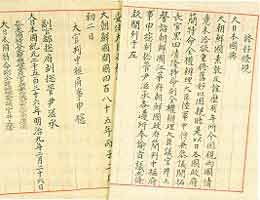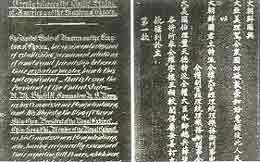| (1) Unequal Treaties and
Movements to Amend Them |
All of the treaties that the
Choson government concluded with Japan since 1876 were
unequal in content. The Treaty of Amity stipulated that
three ports including Pusan should be opened to Japanese
merchants to build houses and to engage freely in
commerce. In addition, Japanese criminals were placed
under the jurisdiction of the Japanese Consul. As for
trade regulations, no customs duties were to be imposed
on trade with Japan and Japanese merchants could engage
in commercial activities with Japanese currency in the
open ports.
The unequal treaties concluded with Japan
not only provided a legal springboard for Japan's
political and economic aggressions against Choson but
also negatively influenced future treaties signed with
the United States, China, Germany, England and France.
Thus, in a short time, Choson concluded unequal treaties
with world powers which greatly infringed upon the
political and economical autonomy of Choson.
|
| |
 |
 |
|
Previous of the Korea-Japan Friendship
Treaty : Signed in 1876, it was the first modern
treaty between the two countries and led the way
to the opening of Korean ports. |
The
United States officially established diplomatic
relations with Korea on May 22. 1882, when
commodore Robert W. Shufeldt negotiated and signed
the Treaty of Peace, Amity, Commerce and
Navigation at Chemulp'o (present-day
inch'on) | |
| |
The government, realizing
that the treaty with Japan was responsible for many
difficulties, made many efforts to amend the article in
the treaty which exempted Japan from paying tariffs. The
government, while sending emissaries like Kim Hong-chip,
to negotiate with Japan, also lobbied for diplomatic
assistance from China and the U.S. Through these efforts
a new treaty with Japan was reached in 1883.
However,
the treaty concluded with Japan at this time was not
equal either. Although Japan was obliged to pay tariffs,
they were marginal and the rights of the Japanese
consular to execute legal judgements and to reside in
the open ports remained unchanged. |
| |
| (2) Plundering Trade and
Grain Embargo |
The other world powers also
forced Choson to conclude unequal treaties which
therefore caused an unfair trade arrangement. Among
them, merchants from Japan and China were the cruelest.
For example, Chinese merchants bought British cotton
goods at low prices in Shanghai and sold them at high
prices to make tremendous profits, and also carried out
smuggling activities under the protection of Yuan
Shi-kai.
The Japanese merchants at first, acted as
intermediaries in trade by buying and selling British
goods but, with the gradual development of the domestic
industry, Japan exported and sold Japanese goods. They
mainly sold cotton goods, matches, liquor and chiefly
bought rice, gold, cowhide and beans.
The Chinese
and Japanese merchants competed in trading with Choson.
But 50% of the amount of Choson imports and 90% of the
amount of exports went to Japan. Rice from Choson, in
particular, was an indispensable trade item to Japan
where industry was developing and cheap rice was
demanded in large quantities.
As a result of the
plundering trade activities of the Japanese merchants in
importing rice, the poor farmers and the laborers of
Choson suffered the most. They had commonly experienced
shortages of food but when rice began to be exported to
Japan, the farmers and workers were even more
hard-pressed. To make matters worse, they had to buy and
use expensive industrial goods imported from Japan.
Thus, in many areas, farmers and laborers frequently
demanded that Japanese merchants be prohibited from
trading and the export of rice to Japan.
The
government foresaw this situation and wanted to insert a
grain embargo clause in their treaty with Japan, but due
to Japanese opposition, such efforts failed. They were,
however, able to obtain a provision which stated that in
cases of famine or other such situations, with one month
prior notification to Japan, grain export might be
temporarily suspended.
With the above provision,
local governors operated the measure to block exports of
rice and soybeans. Among them, the embargo of the
Hamgyong and Hwanghae provinces were the most
famous.
When the exports of rice and soyabeans were
suspended as a result of such embargos, Japanese
merchants made collective protests and appealed to their
home government to add diplomatic pressure. The Japanese
government threatened that unless the Choson government
abolished the embargo and paid for damages to the
Japanese merchants it would attack Choson by mobilizing
its warships.
The Choson government, under Japanese
pressure, was forced to lift the embargos and make
indemnities to Japanese merchants. However, the
unjustifiable pressure and plundering of grain by Japan
planted deeper and stronger anti-Japanese feelings in
the hearts of the Choson farmers and laborers. The
peasant army which rose up with cries to expel foreign
powers reflected this sentiment. |
| |
| (3) Infiltration of
Foreign Merchants and the Movement to Safeguard
Commercial Rights |
The trade activities of the
Chinese and Japanese merchants naturally infringed upon
Korean merchants' activities which had grown in the
latter period of Choson. Therefore, in the open ports
and in important cities throughout the country,
merchants of Choson, China, and Japan repeatedly engaged
in fierce competitive battles around commercial
activities rights.
The Chinese merchants, on the
basis of their superior capital, engaged in many
activities in Inch'on and Seoul. They received the
protection of Yuan Shi-kai and occupied the central
streets of Seoul and carried out trade by sailing
between Shanghai and Inch'on.
The Japanese merchants
developed their activities in the open ports of Pusan
and Wonsan, then gradually infiltrated into the interior
and advanced to central Seoul. They received financial
support from the Bank of Japan which was set up in Seoul
and Pusan and took control of trade by traveling between
Osaka and each of the open ports.
The Choson
merchants engaged in domestic and foreign trade while
confronting the Chinese and Japanese merchants, but they
were soon driven out of the important commercial
activities. Thus, they founded companies or Kaekchu
corporations to collectively challenge the Chinese and
Japanese merchants and sometimes even closed up shops to
protest against illegal persons residing in Choson or
unlawful commercial activities by the Chinese and
Japanese merchants.
But the Choson merchants could
not defeat the Chinese and Japanese merchants who
infiltrated Choson through a strong screen known as
extraterritoriality. Moreover, under foreign
intervention, the government of Choson was unable to
adequately protect its merchants, and Choson merchants
could not help but reduce the sphere of their
activities. The cries of the peasants army and the
Hwalbin-dang to expel the foreign merchants out of
Choson was a reflection of the resentment of Choson
merchants who went bankrupt due to the infiltration of
the foreigners, in particular, the Japanese merchants.
|
| |
| (4) The Succession of the
Rights to Choson's National Resources by the World
Powers and the Movement to Recover Them
|
The world powers took away
various economic rights from Choson. In particular, when
King Kojong was taking refuge in the Russian Legation
and was unable to exercise the sovereign right to
govern, the rights to Choson's railroads, mines, and
forests went into the hands of Russia, the United
States, Japan, France, England, and Germany.
Russia
possessed the rights to the mines in Kyongwon and
Chongsong plus the lumbering rights in the basins of the
Yalu and Ulung Island. The United States held the rights
to construction of the Seoul-Inch'on railroad, the
mining rights to the Unsan gold mine plus the rights to
install electricity and water works in Seoul. Japan
obtained construction rights to the Seoul-Pusan
railroad, gold mining and coastal fishing rights. France
obtained rights to construct the Seoul-Sinuiju railroad.
England held the mining rights to the Unsan gold mines
and Germany had the mining rights to the Tanghyon gold
mine.
When the rights to a country's natural
resources, which are the basis for building a powerful
nation, were transferred into the hands of other
nations, the people began to denounce the government as
corrupt and incapable. The people demanded the recovery
of these rights which had been taken away. The
Independence Council urged, through its publication of
the Independent Newspaper, that the government rid
itself of a policy of foreign dependency policy and
adopt a diplomatic policy of self-reliance. They also
advocated the recovery of these various rights, which
had been taken away by foreign powers, and urged the
development of natural resources in order to enhance the
nation's own strength.
The Hwalbin-dang and the local
people also urged the government to protect national
resources. They pointed out that railroads are like the
artery of the state and construction rights to them
should not be given to foreigners and, therefore, the
Seoul-Pusan and the Seoul-Sinuiju railways should be
recovered.
The cries for the recovery of national
resources from the people in the cities and rural
communities gave impetus to the government to recover
the construction rights to the Seoul-Pusan and
Seoul-Sinuiju railroads. Hence, encouraging private
capitalists to participate in railroad construction and
mine development. However, due to the ever increasing
infiltration of Japanese forces, which grew after the
expulsion of the other invading powers, the efforts for
the development of self-reliance by Choson failed.
|
| | |